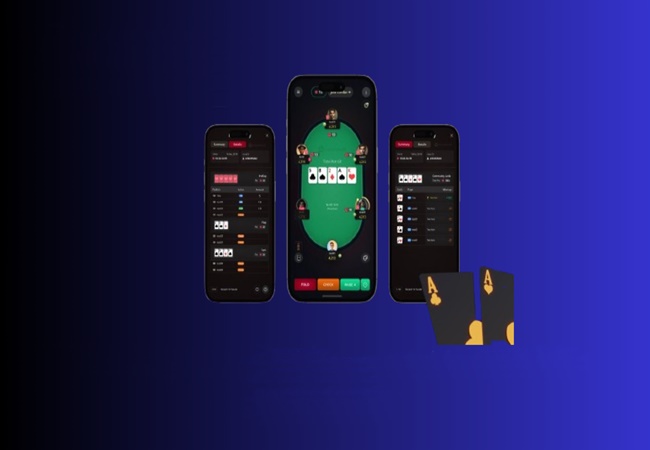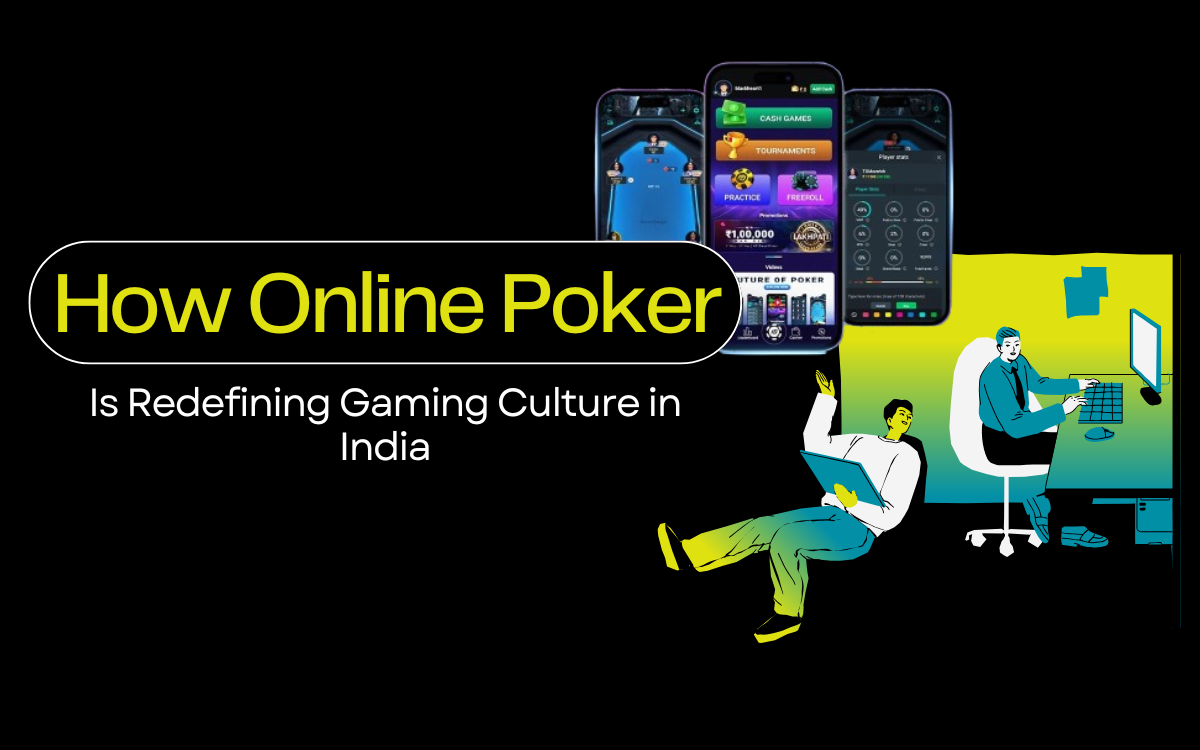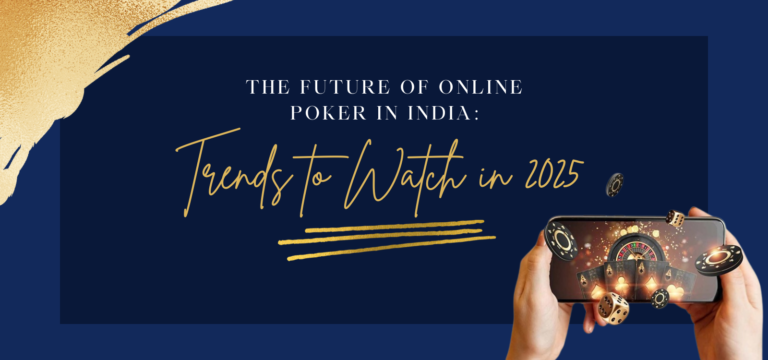How Online Poker Is Redefining Gaming Culture in India
India’s gaming landscape has undergone a remarkable transformation in the past decade, and at the heart of this evolution lies a surprising catalyst: online poker. What was once considered a niche pastime reserved for underground circles is now taking center stage, with poker and Rummy games redefining how millions of Indians perceive gaming, skill-based entertainment, and even career opportunities. This shift marks not just a change in leisure habits but signals a broader cultural rethinking of games, competition, and digital engagement.

The Rise of Online Poker in India
Traditionally, card games have enjoyed immense popularity in Indian culture, particularly during festivals like Diwali when family gatherings often involve friendly games of rummy or Teen Patti Stars. However, poker — especially the online variant — has seen a rapid surge since the mid-2010s, propelled by the widespread availability of affordable smartphones, cheaper data plans, and a growing appetite for digital entertainment.
Major platforms like Adda52, PokerBaazi, Spartan Poker, and PokerStars India have tapped into this opportunity, offering seamless online experiences, lucrative tournaments, and incentives that appeal to a wide range of players, from novices to seasoned professionals. These platforms emphasize poker’s nature as a game of skill rather than chance, a distinction that has helped poker navigate India’s complex legal landscape around gambling.
Changing Perceptions: Poker as a Game of Skill
One of the most profound cultural shifts triggered by online poker in India is the changing perception of gaming itself. Historically, card games were often associated with gambling, a taboo subject in many Indian households. However, poker’s growing reputation as a skill-based game has led to broader acceptance.
This shift was supported by legal precedents in several Indian states, where courts have recognized poker as a game that demands strategy, mathematical ability, psychology, and discipline — attributes far removed from mere luck. As a result, online poker has started to gain legitimacy not just legally, but socially. Parents, once skeptical of their children’s interest in online gaming, are beginning to see poker as an intellectual pursuit, akin to chess.
The Emergence of a Professional Poker Community
India’s online poker boom has given rise to a new generation of professional players who view poker not as gambling but as a viable career option. Names like Nipun Java, Aditya Agarwal, and Muskan Sethi have achieved international acclaim, inspiring young Indians to pursue poker seriously.
Tournaments with massive prize pools, including international events like the World Series of Poker (WSOP) and homegrown leagues like the Poker Sports League (PSL), offer both recognition and financial reward. This professionalization has created a vibrant ecosystem of coaches, streamers, and content creators dedicated to teaching strategy and promoting responsible play.
As a result, poker is no longer seen purely as recreation — it’s also viewed as a fun social event and a career choice for those willing to invest the time to master its complexities..
Poker and the Evolution of Gaming Communities
Online poker has also played a pivotal role in the growth of gaming communities in India. Beyond playing anonymously, many players engage through forums, live streams, and social media groups, sharing strategies, celebrating wins, and even collaborating on tournaments. These communities have fostered a sense of belonging and collective learning, making poker more inclusive and accessible.
The influence of platforms like YouTube and Twitch has been profound, with popular streamers and professional players demystifying games like poker and live Teen Patti, attracting wide audiences. Poker is now part of the broader “e-sports” culture in India, aligning itself with trends like fantasy sports and competitive mobile gaming.

Gender Dynamics: Breaking Stereotypes
Another important aspect of online poker’s impact is its role in breaking gender stereotypes in gaming. Traditionally male-dominated, poker is witnessing a gradual but noticeable influx of female players. Indian women like Muskan Sethi and Nikita Luther have made significant strides internationally, challenging outdated notions about gender roles in competitive gaming.
Many platforms now actively promote inclusivity by organizing women-only tournaments and offering mentorship programs to encourage female participation. This evolving gender dynamic is helping poker — and gaming at large — shed its exclusionary past and become more representative of India’s diverse talent pool.
Challenges and Responsible Gaming
While online poker’s rise is impressive, it is not without challenges. Concerns around addiction, financial risk, and regulatory inconsistencies continue to cast shadows over its reputation. Some states have banned online poker outright, citing fears of gambling-related problems, while others embrace it as a skill game.
To navigate these complexities, leading platforms have introduced responsible gaming features, such as self-exclusion options, deposit limits, and awareness campaigns to educate players about the importance of managing their gaming habits. The broader poker community, too, is increasingly vocal about promoting a healthy approach to gaming — one that prioritizes skill-building, financial discipline, and emotional resilience.
Future Prospects: Poker in a Digital India
As India’s digital economy grows and the stigma around gaming continues to erode, online poker’s influence is only set to deepen. Emerging technologies like blockchain, AI, and VR could further revolutionize how Indians experience poker, making it more immersive, secure, and socially interactive.
Moreover, government regulation — if progressive — could help nurture a transparent, safe, and thriving online poker industry. Legal clarity would not only protect players but also attract global investment, creating jobs and spurring innovation within India’s broader gaming ecosystem.
Educational initiatives and collaborations between poker platforms and mental health organizations could also ensure that online poker evolves sustainably, empowering players while safeguarding against its potential pitfalls.
Conclusion
Online poker is no longer just a game in India; it’s a cultural movement rooted in cultural history, redefining how Indians think about competition, skill, and entertainment. From changing societal attitudes and inspiring new career paths to fostering inclusive communities and challenging gender norms, the rise of online poker encapsulates a broader digital revolution happening across the country.
While challenges remain, the future of online poker in India looks bright. As it continues to grow and mature, online poker will likely remain a symbol of how technology can transform not just industries — but cultural mindsets too.







